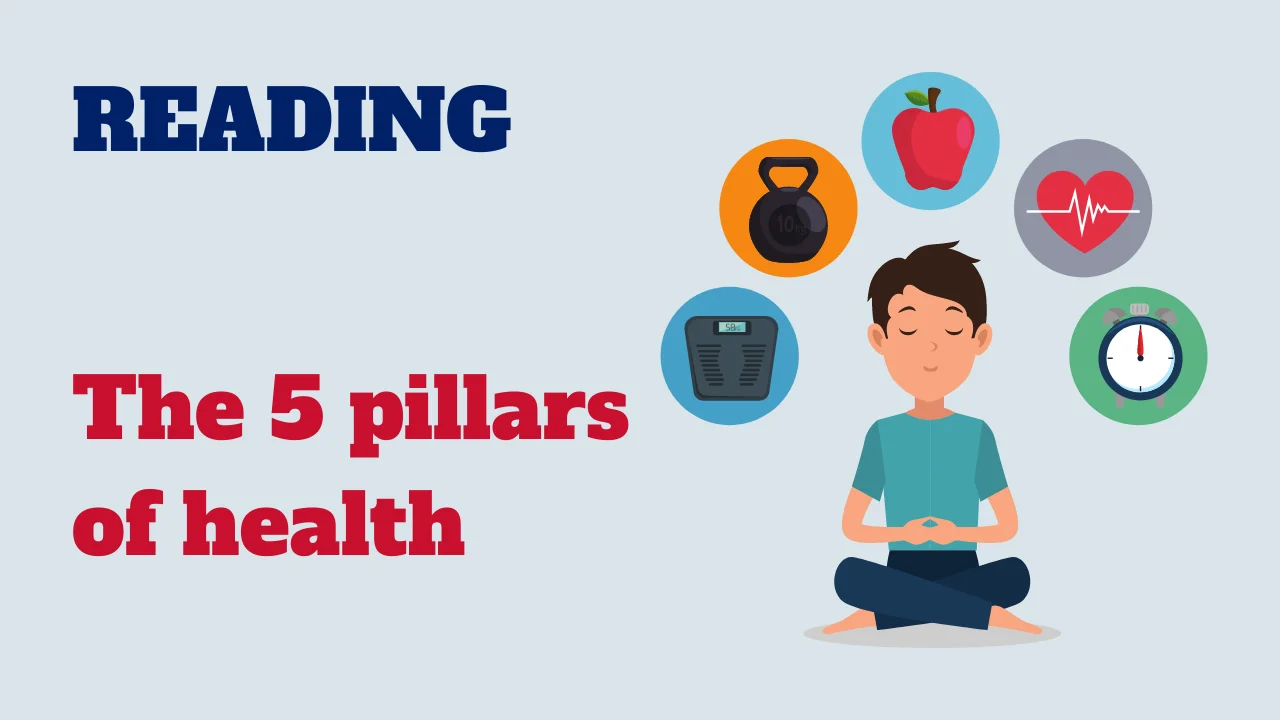Welcome to a reading activity about the five pillars of health and their importance in achieving overall well-being. In this text, we will explore each pillar individually and understand how they contribute to a balanced lifestyle.

Text: The 5 pillars of health
The five pillars of health represent foundational elements essential for maintaining overall well-being and achieving a balanced lifestyle. These pillars are nutrition, exercise, sleep, stress management, and social connections. Each pillar plays a crucial role in promoting physical, mental, and emotional health.
Nutrition is the cornerstone of health. A balanced diet rich in fruits, vegetables, whole grains, lean proteins, and healthy fats provides the necessary vitamins, minerals, and nutrients that the body needs to function optimally. Proper nutrition supports immune function, energy levels, and overall bodily processes, helping to prevent chronic diseases such as obesity, diabetes, and heart disease.
Exercise is vital for maintaining physical fitness and overall health. Regular physical activity, including aerobic exercises, strength training, and flexibility exercises, improves cardiovascular health, builds and maintains muscle mass, and enhances flexibility and balance. Exercise also has mental health benefits, such as reducing symptoms of depression and anxiety, and boosting mood and cognitive function.
Sleep is another crucial pillar of health. Adequate, quality sleep is essential for physical and mental recovery, cognitive function, and emotional regulation. During sleep, the body repairs tissues, consolidates memories, and regulates hormones. Chronic sleep deprivation can lead to numerous health issues, including weakened immune function, weight gain, and increased risk of chronic conditions like hypertension and diabetes.
Stress management is necessary for maintaining mental and emotional well-being. Chronic stress can have detrimental effects on the body, including increasing the risk of cardiovascular disease, impairing immune function, and exacerbating mental health disorders. Effective stress management techniques include mindfulness, meditation, deep-breathing exercises, and engaging in hobbies and activities that bring joy and relaxation.
Social connections play a significant role in overall health. Strong, supportive relationships with family, friends, and communities provide emotional support, reduce feelings of loneliness and isolation, and contribute to a sense of belonging. Social interactions can boost mental health, improve longevity, and provide a network of support during challenging times.
Together, these five pillars of health form a comprehensive approach to maintaining and improving overall well-being. By paying attention to each pillar, individuals can achieve a more balanced, healthy, and fulfilling life.
Comprehension questions
Congratulations on completing the exploration of the five pillars of health! By understanding and implementing these pillars in your daily life, you can work towards achieving a balanced and fulfilling lifestyle. Remember to prioritize nourishing your body, staying active, getting quality sleep, practicing relaxation, and fostering social connections for optimal wellbeing. Keep up the great work in caring for your overall health and happiness!



